Interviews 2007
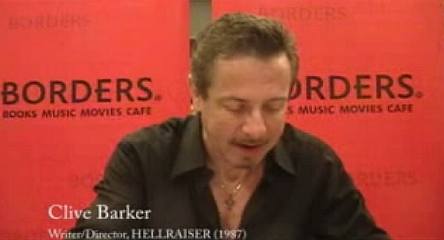
Demons To Others
By Jonathan S. Kui, Demons To Others - The Making Of Hellraiser: Prophecy, 2007
"I think [fans making Hellraiser films] is absolutely great and maybe, actually, they'll end up doing something better than the professionals have done! So God bless 'em, say I, God bless 'em."
Gory Days
By Paul Semel, Complex, February / March, 2007

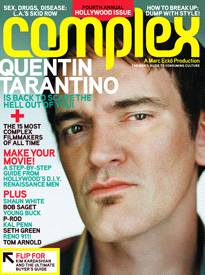 "Length. Complexity. Elaboration of mythology. By and large, movies don't have time for those kinds of details. Games are literary.
A well-constructed game is a puzzle, a story, a philosophy. When people walk into a theatre, the same movie plays for everyone.
But games can reflect your personal tastes and shape themselves to you the way a novel does...
"Length. Complexity. Elaboration of mythology. By and large, movies don't have time for those kinds of details. Games are literary.
A well-constructed game is a puzzle, a story, a philosophy. When people walk into a theatre, the same movie plays for everyone.
But games can reflect your personal tastes and shape themselves to you the way a novel does...
"I've actually had the idea for this game [Jericho] for a long time. The Rub' al-Khali, which is where the game takes place, was in
Weaveworld, but it occupies maybe 50 pages of that 800-page book, so I knew I'd have to go back to this place."

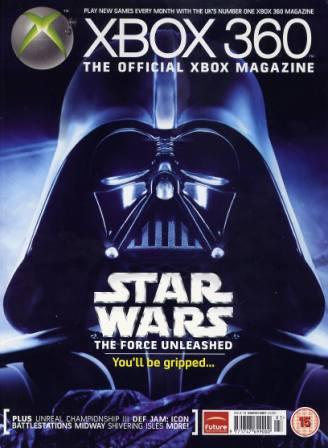
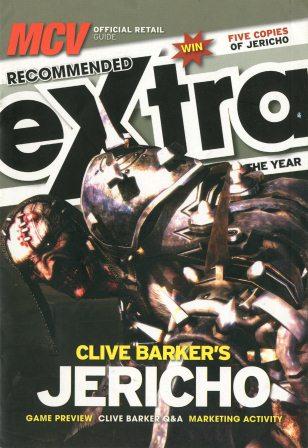
Q&A: Clive Barker's Jericho
By [ ],
(i) online for Xbox 360 print magazine 'Readers Only' at www.oxm.co.uk, 13 February 2007 (ii) extracted as 'Jericho: Clive Barker Speaks!' in
Xbox 360, No 18, March 2007 (iii) extracted in different version as 'Prince Of Darkness' in both PC Zone, No 179, April 2007 and at
Games Radar at www.gamesradar.com, March 2007 (iv) extracted as 'Q & A with Clive Barker' at www.hauntedhouse.com, 2007 (v) extracted as 'Clive Barker' in MCV Recommended Extra, 2007.
"I've liked the Jericho idea since it first came into my head because it marries up two of my passions (History and Horror). Our
protagonists journey through slices of other times in the game, their progress bringing them steadily closer to the Great Adversary
who sits at the centre of this Labyrinth of Time...
"There is indeed a connection in the game to the kind of vast architectural spaces evoked in the work of H.P. Lovecraft. But that's
where the similarity ends I think. Lovecraft's methodology was to continually hint at the presence of vast unnameable and
indescribable forces, which as far as I'm concerned gets a little old after a time. There's only so many occasions in a book when the
author can tell me that the monster was so terrible he doesn't have words to describe it before I become irritated. Right from the
beginning of my career as an Imaginer, I've always taken great delight in presenting the reader, or in the case of Hellraiser, the
spectator, with precisely imagined and elegantly photographed villains. I'm not interested in a beast that the creator claims he can't
show me."

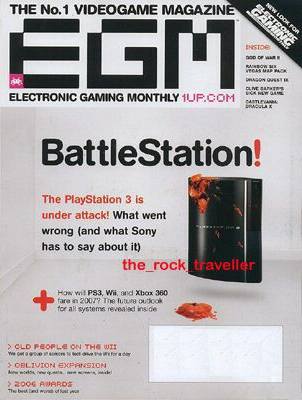
Jericho
By Thierry Nguyen, (i) extracted in Electonic Gaming Monthly, No 213, March 2007 (ii) Game Videos at www.gamevideos.com, 20 March 2007 (iii) extracted in 'Previews: Jericho' by Matt Leone, 1Up.com, 20 March, 2007
"There's a ring of Crusaders who they have to battle their way through because those Crusaders are actually under the influence of
the 'power' and they've been in there, living with their own corruption, not even sure whether they're alive or dead, not even sure
whether they're dreaming this or whether this is reality and it's up to you to get in there and shape the destinies - or the deaths - of
these characters...
"The villain - this is to me essential - is very, very smart. Smart villains fascinate us: Hannibal Lecter is probably the strongest
example, but Pinhead from the Hellraiser movies, I think he gives you the impression, though he speaks briefly, that he's a pretty
smart guy. My villains tend to have a lot of reasons for doing what they're doing."
A Spiritual Retreat
By Phil and Sarah Stokes, 26 March 2007 (note - full text here)
"There's a huge amount on this that has yet to be said that should be winkled out over the course of many questions and answers because I can't suddenly summon up in the middle of a day the words that can really address those issues - religion and the imagination - which are the two issues we have here and are the two largest issues in my life because out of religion comes love and our feelings about death and out of art comes the expression of our doubts and our confusions, because if you were certain about everything you wouldn't make art."
A New Novel - Mister B. Gone
By [ ], entry to Clive Barker's MySpace blog at www.myspace.com/clivebarkerbooks, 10 May 2007
"The rumours are true! HarperCollins will be publishing my new book Mister B. Gone on October 30, 2007. Mister B. Gone is a short horror novel - slightly longer than Thief, but intended for an adult readership - that tells of the discovery of a demonic 'memoir' penned in the year 1438. It consists of one copy only that has been buried by an assistant who worked for Johannes Gutenberg of printing press fame."
Fangoria Weekend Of Horrors
Appearance at Fangoria Weekend of Horrors, Burbank, 20 May 2007, (reported at Fangoria.com by Sean Decker, 20 May 2007)
"I don't believe The Thief Of Always [is] a very difficult book to adapt; you just need to trust the material... We have to disconnect as a group from this stupid game which is played only because the 'vice president of creativity,' the official masturbator in charge of this company or that, is a wallet counter. They are not people who care. You'd think you'd be able to enter into a studio [for a development meeting] and talk to a representative who would know what great horror moviemaking is, but they don't."
Fangoria Weekend Of Horrors
By Madeline Puckett, Creation TV, recorded at Fangoria Weekend of Horrors, Burbank, 20 May 2007 (note: online at www.creationent.com)
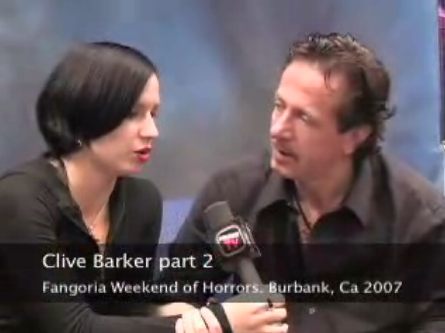 "You can be in a certain mood for painting when the only thing you want to do is go and paint. It doesn't require intellect, it requires
some kind of letting go of intellect, just make the colour talk, you know. I understand why Van Gogh wanted to eat his colours,
colour's a beautiful thing... I love painting. But then there are days when being on my own with a piece of paper and conjuring a world
on a piece of paper in words is also very attractive. I've moved my film-making life from being a director to being a producer, simply
because there's too many other things going on in my life, I can't cut off 18 months of my life to make a movie, there's too many
other things...
"You can be in a certain mood for painting when the only thing you want to do is go and paint. It doesn't require intellect, it requires
some kind of letting go of intellect, just make the colour talk, you know. I understand why Van Gogh wanted to eat his colours,
colour's a beautiful thing... I love painting. But then there are days when being on my own with a piece of paper and conjuring a world
on a piece of paper in words is also very attractive. I've moved my film-making life from being a director to being a producer, simply
because there's too many other things going on in my life, I can't cut off 18 months of my life to make a movie, there's too many
other things...
"I think Los Angeles gets a bad press unfairly. I think, yes, the city is obsessed with movies, no question, and yes, every Monday
people are picking up their Varietys and looking at the grosses and all that, yes. But... I have an extraordinary gallery representative,
Bert Green Gallery, and Bert has opened up an audience of people to see my paintings that I'm not absolutely sure exists anywhere
else around the world. I think the fact that cinema is a visual medium draws a lot of people who really do see with their eyes - it
seems like a dumb thing to say, well of course everybody sees with their eyes - actually people have got their eyes open without
seing a damn thing. One of the pleasureable things I think about being in this city is working with people and making paintings for
people who genuinely are seeing, so that's a huge plus... I'm in Los Angeles for the people and their eyes."
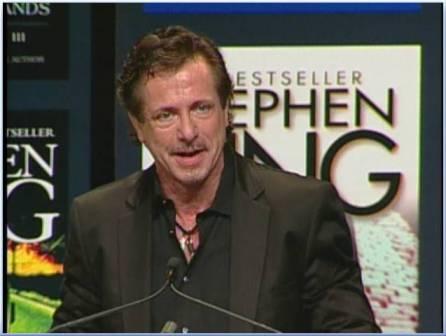
A Gala Tribute To Stephen King
Appearance at A Gala Tribute To Stephen King, CBA Libris Awards, Toronto, 8 June 2007 (note - full text here)
"When my English publishers put out my first stories, The Books of Blood, they were greeted with a very English silence. Polite and
devastating. I don't know what I was expecting, but it certainly wasn't this smothering shrug.
"And then, a voice. Not just any voice. The voice of Stephen King, who had made people all around the world fall in love with having
the shit scared out of them. He said, God bless him, that I was the future of horror. Me! An unknown author of some books of short
stories that nobody was buying."
Mister B.
By Phil and Sarah Stokes, 18 June 2007 (note - full text here) (extracts used by HarperCollins as a "MySpace blog entry by Clive", 23 October 2007)
"I didn't want this [Mister B. Gone] to be a tale of a demon in Hell, I wanted this to be a tale of a demon amongst men and women, observing their ways, observing evil, observing human evil. I suppose I want to show as many ways that the demonic side of us manifests itself and so, towards the end he says, 'I'm giving you a treatise on evil here, I'm showing you all the ways that you use your powers against one another, in threats and seduction, physical threats sometimes, sometimes mental manipulation. I hope it's a very powerful narrative as a consequence because you can read it as being a story of the devil you don't want to know or you can actually decode it and find all kinds of other levels way below. I guess that's something that a lot of my books have, that sort of layering - you can read it one way or another, but this is particularly strong because he is a son of a bitch and you want to hate him, but I think it's hard to do so because so many of the things he feels we all feel or have felt - you know, rejected love..., so many of the things that make Carrion interesting to people... I never ever lose fascination with villains and the idea of speaking an entire novel with the voice of a villain has been, I suppose, just a pleasure, a holiday!"
Keynote Speaker - Hollywood And Games Summit
In conversation with Gina McIntyre, Hollywood And Games Summit, 26 June 2007 (reported at Gamasutra by Brandon Sheffield, 26 June 2007 - note: online at www.gamasutra.com)
"I think that Roger Ebert's problem [with games] is that he thinks you can't have art if there is that amount of malleability in the
narrative. Shakespeare couldn't have written Romeo and Juliet as a game, because it could've had a happy ending. If only she
hadn't taken the damn poison! And I think Ebert's problem is, if something is so malleable, so full of possibilities that aren't under
the artist's control, then it can't be art.
"And that's where he's wrong. Because the artists have put all those options in. Shakespeare might very well have written Romeo
and Juliet, and maybe Romeo is gay, runs off to Venice, has a nice civil wedding... anything's possible! I'm saying we should be
looking at stretching the imaginations of our players, but also ourselves, and saying 'let's try to make everything possible'...
"Let's invent a world where the player gets to go through every emotional churning feeling available. That is art! Offering that to
people is art, I think. And I'm excited about the fact that in the next few years, we're going to see a lot of people playing together.
And it's going to become huge...
"We've lost our imaginations and given them over to people who put plastic toys in with the hamburgers. Fuck them! Let's take our
imaginations away from the people who want the lowest common denominator, and give it to all the people that were shot down in
flames at the age of 5 or 6, who were shot down by their art teacher, who said they couldn't draw a straight line."
Clive Forever
 By [ ],
SFX, No 158, July 2007
By [ ],
SFX, No 158, July 2007
"This is my attempt to bring the legacy to a close and I hope that it is a very eloquent goodbye. I not
only lay out how the Cenobites began, I also lay out how it will all finish. So after this book there is nothing more for me to
do as far as this mythology is concerned...
"Harry comes away from The Scarlet Gospels very much changed.... Harry will enter the third book of The Art having had this
experience in Hell between books two and three. This is my attempt to also honour Doug Bradley and Scott Bakula, who have
embodied Pinhead and D'Amour so well on screen. You know, I want to bid a farewell to at least one of them honourably."
Hollywood Rethinks Its Scare Flair
By Marc Graser, Variety at www.variety,com, 27 July 2007
"Horror doesn't die. It only takes one successful movie and 'It's alive!' again... [Horror] is a very broad and rich genre and shouldn't be assumed to be one thing only... Is Steven Spielberg's War of the Worlds a horror movie? You bet it is."
SDCC 07: Clive Barker Talks Hellraiser, Meat Train!
By [ ], Bloody-Disgusting.com at www.bloody-disgusting.com, 28 July 2007
"I recently turned in a 45-page [Hellraiser] treatment. They [Dimension] wanted a remake and I couldn't do that. I wrote the narrative so that it has eloquence, I wanted to take what we learned from [the] first movie about Pinhead and pour it into this mould... there's a great story in there. It's a horror and a drama, but its bloodier - but most horror movies are bloodier than they were back then."
Torturing Clive Barker
By Jevon Phillips, Los Angeles Times blogs at www.latimesblogs.lattimes.com, 29 July 2007
"I spend $200 every Wednesday on comics. I'm not just here saying I'm a comic book fan; I'm a comic book freak!"

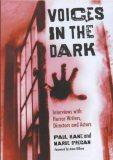
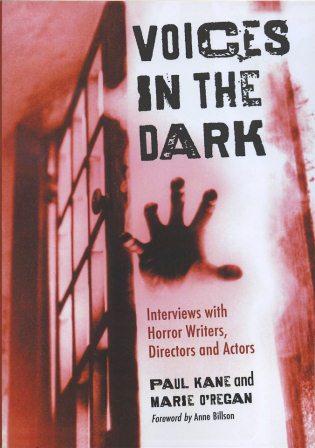
Voices In The Dark by Paul Kane and Marie O'Regan, 2010
Hellraiser's Back In Town
By Paul Kane, (i) Death Ray, No 3, August 2007 (note: newly written article with extracts from the FantasyCon 2006 booklet interview and the Guest of Honour interview at FantasyCon 2006) (ii) full, expanded interview included as "Clive Barker" in Voices In The Dark by Paul Kane and Marie O'Regan, 2010
"As a kid I used to have National Health glasses, the round ones, and they used to be made of pink plastic... And I was tending towards the tubby side, as Winnie the Pooh would say, and would get a little fatter before I thinned out. Obviously I got bullied and knocked about a bit for that when I got into my junior school. But yeah, I was doing my dreaming and I had all the books that were classics for all of us sitting on my little bookcase. It was really a pride for me to be able to build up a little library."
Quint Trades Some Words With Clive Barker!!!
By Quint, Ain't It Cool News at www.aintitcool.com, 7 August 2007
"The [Midnight Meat Train] trailer is a tease and that's all it can ever be really, but the build, my God, the build of really nice
performances and really lovely performances and then this descent into madness, which the character of Leon, who is an
accountant in my original story, has become a photographer, which is actually a much better choice in the movie. It's a
better choice, because like Weegee... Are you familiar with Weegee...? This is a photographer whose name was Weegee and
Weegee was, if you google him, you will find some of the most profound and well-known images of New York are of his creation.
And he's an extraordinary power and I thought it was a great idea to turn this accountant, who was very hands off, into somebody
who was investigating with his camera, you know...? The feeling with his camera, going into the heart of the city... Is it fault or is it
simply destiny? Is it fault or fate, you know? Also faith, it's just a couple of letters difference and you have a very different
conclusion...
"I think it's cool, because I think the kinds of narratives that work on the page are not always right for the screen and while I'm...
there are times when it annoys me when narratives are arbitrarily changed for a movie. Most of the time and in the case of
The Midnight Meat Train, the changes aren't arbitrary, they're thought through. They are really about giving weight and meaning and
class to the journey that this man is taking into the heart of darkness, to quote another famous journey. I actually hadn't thought
about that, but I suppose that's what he really is doing. Maybe I thought about that at the beginning. Maybe I did think of that one
when I first started to write it, but I haven't thought of that in a long long time."
Clive Barker's Jericho To Feature Original Soundtrack By Cris Velasco
By [ ], Codemasters Press Release, 17 August 2007
"Cris Velasco's music for Clive Barker's Jericho is exquisite. Filled with yearning, dark energy, threat and redemption, it is the unstoppable engine in the terrifying ghost train of Jericho."
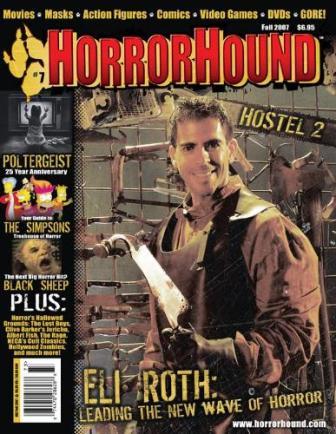
Clive Barker's Jericho
By Jessica Dwyer, HorrorHound, No 7, Fall 2007
"The kind of explosion of wild creature possibilities that were a part of [Nightbreed] have transferred to Abarat. I've got 750 paintings
here now for Abarat and I've used about 240 so far. As the five books get darker and darker - trust me, they get darker and darker -
a lot of creatures that once would have been Nightbreed come strutting back into my imagination and go onto the canvas.
"So nothing is ever lost, no monster is ever lost in the dark, there's always Clive with the lamp to find them."
Clive Barker Waxes Gory On His Cult Shooter Jericho
By The Gamepros, GamePro at www.gamepro.com, 5 September 2007
"It's the first of what will be a series of stories about a group of militarily trained but magically gifted men and women who deal
with powers that are beyond anything that you or I would ever imagine. This particular case is a confrontation with a thing called
'The First Born,' which lives in a labyrinth of time located in the middle of a place called the Al-Khali. It's the emptiest place in the
world, the empty quarters of the Sahara desert.
"The First Born lives in the centre of this wasteland, like at the centre of a series of Russian dolls. So you can think of him being
at the centre of the smallest Russian doll, and the doll outside that being the first army to attempt to limit his control, but whose
soldiers he [converted] into his own warriors. Then outside that level is another level of even more recent soldiers who've also gone
up against him [and lost]. In the beginning in the game, the First Born is about to make some big, world-threatening move.
[Your squad is] called to the region because they have had signals that there is life, the life form in the centre of this labyrinth,
and even they do not know what the life form is. The First Born is on the move, he's gaining power, and your team figures the best
form of defence is offence. So rather than wait around for the bad stuff to happen, they're taking it upon themselves to go deal with
this guy. But in order to get to him, they have to move through generation after generation of [mutilated] soldiers, all of whom fight
in different ways...
"I want to do three of these, just three, and make it the Jericho trilogy in which this son - I gave a clue there, I didn't intend to.
Okay, the First Born is the son of something. Oh well. It's not a terrible thing; it's kind of funny. But when we have the trilogy
together I think we'll have this fucking huge confrontation between what may end up being a suicide club of men and women who
are willing to give their souls and their bullets to the business of destroying the son of something. I mean, in a way it's already
there in the 'First Born'."
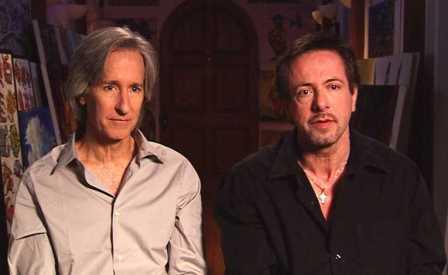
Spine Tingler
By Mick Garris, Spine Tingler: The Making Of Valerie On The Stairs, 2007
"What happens if you live in a world in which the things which are most important to you: the products of your imagination, are constantly rejected? And what do you do with that energy, what do you do with that frustration? I wanted to see what would happen if you filled a house with writers who were dealing with their own demons and had not even been published."
Hellfire And The Demonation
By Phil and Sarah Stokes, 7 September 2007 (note - full text here)
"[Mister B. Gone]'s the reverse of what very often I've done - Imajica, if you will, puts in everything; this time I'm playing lightly but I think if one's open to it, or if one follows the track that the sentences lead you off on, it's very near to the scale of the issue which is being addressed in that book. I hope that this book is more acceptable for readers who can't face a 900 page book like Imajica! A lot of people would never pick up a book like Imajica. But I think people will pick up Mister B. Gone and I hope will find some provocation in it. I mean, as the fundamentalists in the world become ever more fundamental, I don't think it's a bad time to play with people's ideas as to what's right and what's wrong."
Clive Barker Knocks Down Jericho's Walls
By Brian Warmoth, Wizard, 11 September 2007 (note - full text online at www.wizarduniverse.com/)
"Traditionally, horror is difficult for designers because so much relies upon surprise. But there's another kind of horror which
depends upon the slow erosion of your hope. I think [Jericho] works more like a novel than a short story. You are taking a long
journey, you're finding out things about your enemies as you go. This is not some little ghost story. It's as raw as we can be...
"[As a player] you have to be very smart because it's not so easy to be aware that you have on the one hand very mechanical
weapons and on the other magic and supernatural weapons. Balancing out their usage is by no means easy. Where I fail
constantly [when I'm playing] is getting that balancing right. I overuse the magic weapons, whereas the experienced shooter is
going to go straight for the guns. You've got to have the balls to be able to satisfy the demands of war on natural and
supernatural bases."
Clive Barker Talks Jericho
By Carnell, Fangoria.com, 17 September 2007 (note - full text online at www.fangoria.com)
"I've been creating games and stories and working very happily alongside game designers for a while... Video games are about as far from my creative reach as is possible to get. There's no way I could do something like that, but creating the narrative or, better still, creating a narrative and maybe contributing some images as well... yeah, that's absolutely something I'm delighted to do."

Clive Barker
By Curt Feldman, (i) GameTap.com, 21 September 2007 (note - full video footage online at www.gametap.com) (ii) reported as 'The Devil's Business', GameTap.com 26 September 2007 (note - full text online at www.gametap.com)
"There's more I want to accomplish for the title, there's more I want to accomplish with the form, there's more I want to accomplish with the Jericho squad in the sequel. I want to do multiplayer versions of this game and of other Jericho games. I want to take the squad into even darker places."
Clive Barker Talks About Jericho
By Scott Steinberg, Podcast, Digital Trends.com, 26 September 2007 (note - full podcast online at http://news.digitaltrends.com/)
"Oh, the Ebert thing, sure - talk about unwitting! I knew zero about the fact that this was going on!
"I got this huge [printout] - half an inch thick - of stuff that had come from not just my observations on Ebert's observations, but
Ebert's observations about me! Something about me being a four year old, or something, talking like a four year old - something
really flattering like that.
"My late father had many skills but one of his skills, which almost rose to genius, was his skill to write
killer letters - letters that would stop people in their tracks and after they'd read them people would have to take sharp
objects from around the person, the receipient's presence - they were really, really harsh letters. And he'd write them usually to
puffed-up dignitaries or people who were just, you know, a-holes and had, for some reason or other, got on the wrong side of my
Dad - usually, as I say, puffed-up individuals who needed taking down a peg or two. Mr Ebert falls into this category. And
channelling my beloved father's spirit, I wrote a long letter which would have been my riposte to his riposte to my riposte to his
riposte! Or something like that! But then I learned - and I didn't know this - that he was sick. I didn't realise he was so seriously
sick and good taste prevailed and everybody said, you know, don't do this and my heart said don't do this so I trashed the letter.
But every point that he made was brilliantly refuted by one or other of the people online who commented about Ebert's insolence
and it's a pomposity that's laughable in the end and is not hard to walk away from.
"It took me a long time to write the letter, but in the end it just wasn't worth it - he's a pompous, arrogant old man and he's not
going to stop us making games or enjoying them - or, by the way, making them art."
Clive Barker On Jericho
By Greg Edwards, GameSpy.com, 1 October 2007 (note - full text online at http://uk.gamespy.com/)
"Movies typically don't have time for things like length, complexity, or elaboration on mythology. When you step out of a movie,
four hundred new people walk in, and exactly the same movie plays out. But a game can reflect your personal tastes and can
shape itself to you the way a novel does, and this is happening more as the technology advances. Games are actually much
more literary than movies; movies are just passive...
"I've actually had the idea for this game for a long time. The Rub' Al-Khali was actually in my novel Weaveworld, which I wrote in
1985. Though I only used it briefly; it occupies maybe 50 pages of that 800-page book. So I knew I'd one day come back to this
place."
Jericho Presentation
Transcript of a press event with Mercury Steam at the Casino de Madrid, Spain, 10 October 2007
"I want to take this opportunity, before we look at the demonstration and before we talk to each other - which is much more
important to me than monologue - I do want to take this opportunity to say something which I know all of you know, but it is
important to emphasise: the making of a game is not the work of one man. Even though my name is above the title, I was not
alone in this huge endeavour.
"I have worked with the guys at Mercury Steam over a period of years now, developing, sending drawings backwards and forwards,
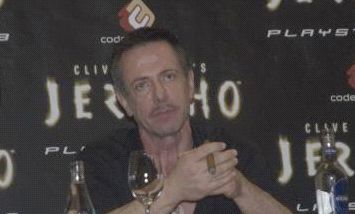 sending ideas backwards and forwards, always trying to push the envelope, always looking for the taboo, the forbidden. Always
trying to find images that have not been seen before. This is hard. In gaming there is a tendency, as there is in every other art
form - and it is an art form - for games to resemble the games that came before them. So we have a lot of games that
look as though somebody had been reading Lord of the Rings, a lot of games that suggest someone saw The Matrix and while,
of course, you can never be completely new because it's not the nature of the human imagination to be able to push out
everything that you know, wherever we found something in the work that looked too much like something else in somebody
else's work, we threw it out.
sending ideas backwards and forwards, always trying to push the envelope, always looking for the taboo, the forbidden. Always
trying to find images that have not been seen before. This is hard. In gaming there is a tendency, as there is in every other art
form - and it is an art form - for games to resemble the games that came before them. So we have a lot of games that
look as though somebody had been reading Lord of the Rings, a lot of games that suggest someone saw The Matrix and while,
of course, you can never be completely new because it's not the nature of the human imagination to be able to push out
everything that you know, wherever we found something in the work that looked too much like something else in somebody
else's work, we threw it out.
"The folks at Mercury Steam have been extraordinary in their patience with my desire and ambition for this game. I have had,
until now, bad experiences with games, but I have faith in the medium."
Hype Arcade: Jericho
By [ ],
 Stuff, No 95, October 2007
Stuff, No 95, October 2007
"What makes the demons scary is the speed at which they come at you, the size of their claws, the fact that some of them don't have heads... Shall I keep going? They have these massive sores all over them, which may or may not be eyes. We designed these things down to the last hook and talon. You will know when you've gotten to the end of the game - assuming you ever do - that you have gone a round with some of the most intense and brutal monsters in gaming. I think that there's a very good chance people will feel deeply disturbed by this game."
Mega-Interview With Clive Barker
By Christopher Monfette, IGN.com, 11 October 2007 (note - full text online at http://uk.stars.ign.com/)
"You catch me on a day after a night in which an entire story was given to me in my dreams. I have my cards beside me and I woke up, clear as hell, and there it was. I was able to write the whole thing down between 5:00 and 5:15 in the morning. And when I woke up, it actually made sense. Which isn't always the case... But you get given these presents; you get given these gifts. And you just have to be very quiet. It's like photographing wildlife. Just be very quiet and very patient and, eventually, the thing will come to you."
Geniuses At Play: Scare Tactics
By [ ], Playboy.com, October 2007 (note - full text online at www.playboy.com)
"Sometimes you have to wait a little while to find out where things want to settle. I've been playing with this idea [for Jericho] of this city with rings of dead armies for several years. I knew one day I would do something with the Empty Quarter. And people have told me you could make a movie of this, but the truth is, a movie would horribly truncate the complexity of what we're trying to present. As far as novels versus games, novels work best when the reality of the internal life of the character is contrasted with the strangeness of the exterior that he or she is passing through. In games you see very little of the interior of the characters, there's only an exterior. Because it's a visual medium you can't express the kind of thought forms that a novel presents. In a game, you're certainly inside the experience much more than you would be in a movie, but you're never going to be as much as you are in a novel. So it's horses for courses. When I choose which medium to use I'm really looking at how much of the story is about events and how much is about internal change."
The Devil's In The Details
By Constance Droganes, CTV.ca, October 2007 (note - full text online at www.ctv.ca)
"There's a bit of the devil in all of us. There's so much in our natures that is profoundly wonderful. We're capable of such great
good in spite of our baser instincts. It's like that Tom and Jerry cartoon with the two angels sitting on their shoulders. It's a
universal image but we all understand what it means...
"The wounds we bear we deliver onto other people at some point in our lives. That idea is very much at the heart of this book.
We pass the hurt along. It's like the school bully. He was probably going home to be bullied by his father.
"I wrote Jakabok from a place so deep inside from my past, where I felt the same kind of hurt and it flowed so passionately. If
I had known then what I know now about why people are so cruel it would have changed a lot of things for me."
The Manuscript Of Jakabok Botch
By Jovanka Vuckovic,
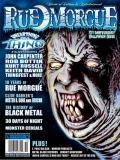 Rue Morgue, No 72, October 2007
Rue Morgue, No 72, October 2007
"Sometimes a voice - I don't want to sound crazy here - sometimes a voice appears, a voice that I can adopt, almost like an
impersonator would adopt a voice, and I knew this demon's voice... and I knew if I let this voice speak, it had a story to tell. I know
how wacky this sounds...
"I wanted to take all literary devices out of the book: chapter stops, part stops, there's no biography of me in the book, there's no
photograph of me on the back. This is Botch's book, and I felt possessed by Botch while I was writing it. I would go to my desk
every morning and I would stay there till unholy hours of the night."
Clive Barker's Jericho
By Brian Warmoth, Wizard, No 192, October 2007

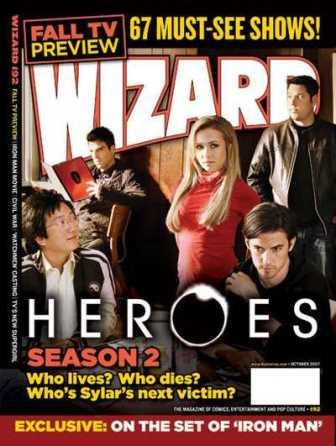
Wizard, No 192, October 2007
"These are essentially chrononauts, travelling through time. It isn't literally travelling through time,
but they're going through different environments. There's something about war zones. When I was a kid
in Liverpool, England - which is a port, so it was heavily bombed in the war - I played on bomb sites. The
park was a long way away, but where someone's house had once stood, you coud play there. It had a deep
impression on me that you could turn over bricks and there would be pieces of someone's life rotting
underneath. Some of what I brought to [Jericho] is being haunted by those visions."
At War With God's Bastard Child
By Monica S. Kuebler, Rue Morgue, No 72, October 2007
"What's nice [about Jericho] is each level of time that you pass through, you see different styles of interraction between the two sides, different warriors, different demons, and writing a narrative that allows for all of those variations of violence, of battling, is a completely different gig to writing a novel which is very much more internal. Games are about externality, they're about what is happening outside in the world, you might be inside the head of someone who is holding a gun, but that person is dealing with the terrors that are right in front of him."
Clive Barker
By Todd Melick, GamePro, 23 October 2007 (note - full text online at www.gamepro.com)
"It is a common thread, and not just in my narratives but in everything from Beowulf onwards that describes the world of the
fantastic lying just around the corner. I don't write closed worlds. Lord of the Rings is something that I'd call a closed world
narrative. You and I wouldn't belong there; we wouldn't make very good orcs. The interesting thing to me is to take a real world,
one that we recognize, a world in which you and I could walk.
"And then we turn a corner... in Alice in Wonderland you fall down a rabbit hole, or Narnia you step through that wardrobe,
Dorothy being take away by a tornado. All of these are methodologies in which you cross over from the world of the real to the
world of the super-real. Notice I didn't say fantastic, I said super-real. I think these worlds that we go into mean something to us
because they touch our mythological sense; the idea of passing through time zones to move toward a demon or a force of evil that
must be destroyed and to quote the title of Joseph Campbell's book, this is The Hero's Journey; a journey that has been taken by
heroes over and over again. The definition of a hero I think is: he who does not flee when the darkness arrives on the horizon but
turns to face it...
"To me art should always have an element of provocation if it's going to have any value at all. It can't be all reassurance. Let Ron
Howard have that. I'm not into that. I'm much more interested in getting people to get up off their asses and take some time in the
world to do better by it. When they retreat into fantasy, which honestly isn't a retreat at all but is more of a renewal, they find that
the fantasy also has an element that is anarchic, special, and challenging. God help us that art should put us to sleep. I want
things that I make to be loved or hated. I don't mind. I just don't want them to be shrugged at."
The Clive Barker Interview
By N'Gai Croal, Level Up, Newsweek.com, 24 October 2007 (note - interview took place in July 2007, full text online at www.blog.newsweek.com/)
"I believe that when anybody is trying to - when mighty
eyes are turned upon us artistic mortals and people start to get a little anxious about what you're doing. You're probably doing
your job. And I think that that is certainly, what I hope comes out of [Jericho] or out of [Mister B. Gone].
"I mean, this book, Mister B. Gone, this book suggests that the novel you have in your hand, literally this thing in your hand, is
possessed. The book you've got. The voice out of this book will address you directly for the full length of the book. It's a 70,000
word book and not for one moment are you not aware that this thing is reading the sweat marks you're leaving on the page and
analyzing their content to see how scared you are or how best to work you. And nor does he even attempt to - it's a demon -
nor does it even attempt to dissuade you that it's doing so. It says, 'If I really want to, I could make you hate yourself and with
this book turn you all bloody.' My editor, actually, having read the first few pages went to St. Patrick's, said a few prayers, then
went back to read the rest. I thought, 'I must be doing something right.' "
The Kevin And Bean Show
By Kevin And Bean, The Kevin and Bean Show, KROQ Los Angeles, 26 October 2007 (note - podcast available online at www.kroq.com/)
"It's called Mister B. Gone and it's me returning to my roots, it's me writing about Hell, my favourite subject...
"This voice came into my head and I thought, 'Man, I want to write this guy, this is a demon and I want to write his life story.' So
that's what this is, this is the life story of a demon told from his point of view. And they've packaged the book so that it looks like
a 15th Century book which is kind of cool, I think - even the pages smell kind of weird..."

Vintage Violence
By Tim Wapshott, The Times, 27 October 2007
"I have no interest whatsoever in turning [Hellraiser] into a game. Apart from anything else, I don't own the rights: I earned $21,000 from writing and directing the first movie and that was my deal with the Devil. We look over our shoulders too much anyway. Let's look forward. I have huge faith in what the gaming medium can be. It's not all about technology, it's got to be about something else as well - obvious things like caring about the characters."
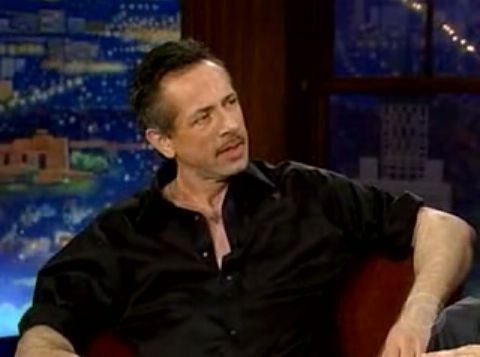
Late Late Show With Craig Ferguson
By Craig Ferguson, Late Late Show With Craig Ferguson, 29 October 2007
"I wanted to write a possessed book. I figured if a demon could possess a little girl, as in The Exorcist, why not a demon possessing a book?"
Clive Barker: Jericho
By [ ], Tout Le Cine.com, 29 October 2007 (note - full video available online at www.toutlecine.com)
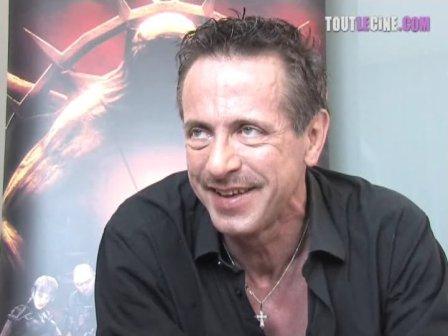 "[The start point for Jericho] was the notion of, the very exciting notion, to me, of having slices of time in which a battle was still
being fought and re-fought
by ghosts, phantoms of soldiers - who had a physical reality, they weren't the kind of ghosts who pass through and they have a
physical force to them. But I liked very much the idea that you would pass through the Roman soldiers, or pass through the
Crusaders and meet the Roman Centurions and that each slice of time would be different in its feel, in its music, in the way that
the battles are fought."
"[The start point for Jericho] was the notion of, the very exciting notion, to me, of having slices of time in which a battle was still
being fought and re-fought
by ghosts, phantoms of soldiers - who had a physical reality, they weren't the kind of ghosts who pass through and they have a
physical force to them. But I liked very much the idea that you would pass through the Roman soldiers, or pass through the
Crusaders and meet the Roman Centurions and that each slice of time would be different in its feel, in its music, in the way that
the battles are fought."
Gone And Back Again
By Carnell, Fangoria, No 268, November 2007
"I've always liked the idea of a house under siege. It's something you see a lot of in medieval paintings: people going about their
daily business while angels or demons apparently invisible to the human eye are lurking around them. That was a very
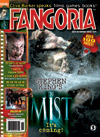 attractive concept to me. It seemed very consistent with my mythologies which are very often to do with things we don't see,
but are very close to us. You know, The Great and Secret Show is the title of a novel, but it's also a description of what I do,
which is unveil the great and secret show. In this case, the show is happening around Gutenberg's house in a war for his soul,
but it's also a battle for something else...
attractive concept to me. It seemed very consistent with my mythologies which are very often to do with things we don't see,
but are very close to us. You know, The Great and Secret Show is the title of a novel, but it's also a description of what I do,
which is unveil the great and secret show. In this case, the show is happening around Gutenberg's house in a war for his soul,
but it's also a battle for something else...
"But I knew I had a destination in the narrative. I could feel the house and the war and what it would feel like to be besieged
by powers of great good and great evil. As I said, that seemed very consistent with work I've done before in terms of imagery,
except this time it really is medieval. And I got a chance to put words to all the beloved images in Bosch, Bruegel and Grunewald
which still have an extraordinary power to compel and yet distress. I wanted to get into that a little bit, and do in
words what they'd done so brilliantly in pen and ink and oils."


Voices In The Dark by Paul Kane and Marie O'Regan, 2010
Barker Gets Darker With Mister B. Gone
By Paul Kane, (i) Dreamwatch Presents Total Sci-Fi, 1 November 2007 (note - full text available online at www.dwscifi.com) (ii) full, expanded interview included as "Clive Barker" in Voices In The Dark by Paul Kane and Marie O'Regan, 2010
"[Mister B. Gone took] five months. Including different drafts. I wrote it in a sort of madness. Once I started, I couldn't stop. It was strange, it was very strange. I even suspended painting for a while, which I haven't done for a long time and was not good for me physically. I actually keep fit by painting four hours a day. And it wasn't good to suspend that. But Jakabok, dammit, called me back to the page. Even when I was weary, I couldn't shut him up; he was there in my head. I knew what the next sentence was, always, always."
Interview
By Steven Cook, conducted during a signing at Third Place Books, 6 November 2007
[Re.atomic bomb test at Trinity] "My sense is that they knew far more about how brutal the effects were going to be than they
were letting on. The protestation that, 'Oh well, we really didn't know how it was going to be' was just that, it was a big put on
because I think they knew very well.
"My sense is that if they had told the truth about what they really knew about how ghastly not just the short-term consequences
but the long term effects were going to be - some of which even today we don't really know, right? - there would have been a
much louder outcry. Whereas what really happened was that there was first a huge sigh of relief that the war on the Eastern front
had ceased and that the Japanese had surrendered and that the Second World War was over."
Jericho / Hellraiser: Clive Barker Reveals All!
By Mister Disgusting, Bloody Disgusting.com, 7 November 2007 (note - full text available online at www.bloody-disgusting.com) (interview took place in Madrid in October 2007)
"I will watch over two Frenchmen who will remake it [Hellraiser] and only because I think they are two very splendid young men who made a fucking great movie. I like them both. I like the movie 'Inside'. It's very good, very bloody and they are very nice smart guys who have a commitment to the original movie."
Book Talk: Clive Barker Insists On Fantasy In Horror
By Belinda Goldsmith, Reuters, 7 November 2007 (note - full text available online at www.reuters.com)
"I am not sure the H word - horror - is terribly useful. I think it is fine if you are describing the movie Hostel but Mister B. Gone
does not fall into that category. It is about the word and the power of the word told through the confessional of a
demon who has had a pretty bad lot in life.
"Horror has changed and it is not to my taste at all. My kind of fiction has always been laced with the supernatural and I have no
interest in watching people taken apart limb by limb just because special effects can pull those things off. I'm not entertained
by the spectacle and feel faintly dirty by it... Hellraiser always had the element of the fantastic and that is its get-out clause.
It is my way of saying that I take the subject matter seriously because I take the business of good and evil seriously. I
think describing me as fantasy-horror is on the money as that is where I am. To me denuding horror of its fantastical elements
is dangerous."
The Art Of Clive Barker
By Jody, DoorQ, 9 November 2007 (note - full text available online at www.doorq.com) (interview undertaken at the Bert Green Gallery, 8 November 2007)
"Nobody talks about this part of the genre. People are most familiar with genre movies, books and TV. This though is another part of the artform that doesn't get enough press. This kind of work needs to get more press."
Barker Raises Hell!
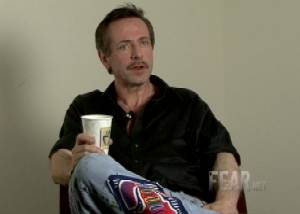 By Joseph McCabe,
FearNet.com, 9 November 2007 (note - full video available online at www.fearnet.com)
(interview took place in New York on 1 November 2007)
By Joseph McCabe,
FearNet.com, 9 November 2007 (note - full video available online at www.fearnet.com)
(interview took place in New York on 1 November 2007)
"That's the cool thing about the opportunities I've been given as a writer, as a painter, as a filmmaker, I've had a chance to do some fantasy, do
some stuff for younger audiences, do the straight-on horror, the psychological stuff and I think people know now that whenever Clive Barker comes
out with something, it's going to be a little bit different from what came before. I'd like to be predictable for being unpredictable...
"It's a thing of beauty when you find an idea, a voice, a point of view that you know will carry you into a world and give your reader, your
spectator, your audience something new. I mean, I'd like to think I'm halfway through my creative journey and if I could continue to originate,
continue to make new stories, new images the way I've been lucky enough to do in the first half of that journey, I'll be a happy man."
Clive Barker Deals With His Demons In Mister B. Gone
By Rob Lowman, (i) Daily News, Los Angeles, 11 November 2007 (ii) (as'Clive Barker Sets His Demons Free') Inland Valley Daily Bulletin, [13] November 2007 (note - full text available online at www.dailybulletin.com)
"Jakabok's in the place where the word becomes emancipated, somewhere around 1438-39 in Mainz, Germany, the time of
Johannes Gutenberg. There, angels and devils have gathered, understanding the power that the inventor's printing press will have,
and each tries to use their influence.
"[Re identifying with Jakabok] But who else can you choose? In a curious kind of way, Jakabok has his own integrity, and I find
that moving. He is very much a man of the moment - how he feels and how he suffers and how much he feels the need for
revenge and how much he feels the need for love. I find him more honest than the other characters in the book. I think the other
characters in various ways are hypocritical and in love with their own self-importance."
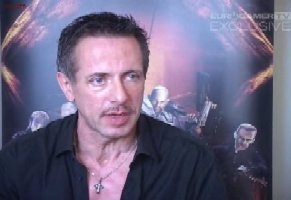
The Eurogamer TV Show
By [ ], Episode19, Eurogamer TV, 16 November 2007 (note - full video available online at www.eurogamer.net)
"You put a lot of work into these things - yes, you get paid well for it, but actually there's a lot of things that I could do that would
make me a lot of money a lot quicker!
"I have a sense that games can be something marvellous, and sometimes are something marvellous."
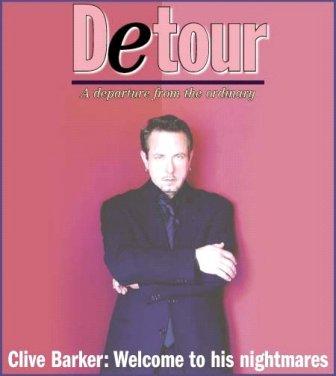
Pushing The Boundaries Of Horror And Fantasy
By Larry Nichols, Detour, Philadelphia Gay News, 16 November 2007 (note - full text available online at http://epgn.com/)
"I think people are more easily scared and more willing to be scared now than ever, I think we seek out the comfort of the safe scare that the literary and cinematic scare gives us. It gives us a way to be afraid but to know that we can walk away from the experience whole and unharmed, which is not the case in the real world. People are as hungry for horror as they ever were. I have a good cross-section of readers. I think that the line where fantasy becomes horror or horror becomes fantasy has become pleasantly blurred. I like that blurring. People are open to all kinds of narrative experiments. [Guillermo] del Toro's work, for instance, in Pan's Labyrinth. It's a great movie. Is it fantasy? Yes. Is it horror? Yes. It's an extraordinary compilation of possibilities. Those kinds of possibilities are what I'm after in my literature."
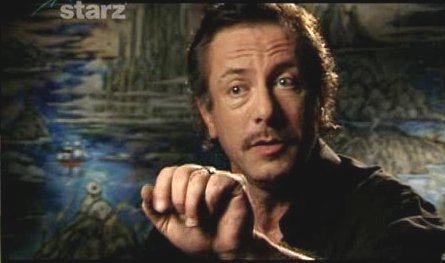
Hollywood Goes Gaming
By [Richard Roeper], Starz Inside, 26 November 2007
[Re. the future of gaming] "You're actually getting closer and closer to something that you haven't even seen yet."


Voices In The Dark by Paul Kane and Marie O'Regan, 2010

Mind Probe: Clive Barker
By Paul Kane, (i) SFX, No 158, December 2007 (ii) full, expanded interview included as "Clive Barker" in Voices In The Dark by Paul Kane and Marie O'Regan, 2010
"It was important that everything [in Mister B. Gone] be contained within the words. In fact at one point somebody suggested I do
some illustrations, and I said, 'Christ, no. Absolutely not!' This is about characters who live in our imaginations, conjured through
these words. I don't want to do anything that could compromise that conjuring...
"[It's] exactly the opposite of Abarat. This is a book about 'The Word'. Where 'The Word' comes from; where 'The Word' goes;
what 'The Word' can achieve; and what 'The Word' can fail to do."
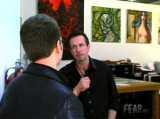
Clive Barker
By Joseph McCabe, FearNet.com, December 2007 (note - full video available online at www.fearnet.com) (interview took place at Bert Green Fine Art in December 2007)
"The images behind me are, for some people coming to see them, they are offensively raw. There's a triptych of Beasts against a landscape and they look as though they've been tearing at each other for a long time; they are bloody and they're ragged and they're painted in that way. And that's how I feel a lot of the time when I'm painting. It feels like a physical struggle, not a mental one, not an intellectual one."
Q&A: In The Garden Of Eden: Clive Barker Talks Game, Creative Process
By Christian Nutt , Gamasutra.com, 4 December 2007 (note - full text online at www.gamasutra.com)
"I think, to me, the game is when you get out of the natural into the supernatural. Out of the realistic into the surrealistic. To me, that's when you
cross a threshold and something interesting happens. For one thing, you're not making material that needs to be easily copied on the streets; you
know, nobody's going to be doing an impersonation of the material of the game. And that's important.
"It's important that we be in this area where we're free of the limitations of reality. And we can play; the imagination is at play. It's Bosch; it's
Hieronymus Bosch for the 21st century. That's something that I'd like to see."
Working In The Midnight Hours...
By Phil and Sarah Stokes, 17 December 2007 (note - full text here)
"I'm glad to be actually writing Abarat Three, which is what I'm doing right now... Everything's been going beautifully, and you can let
everyone know that I am halfway through the penultimate draft...
"The books are going to have pictures that are frightening, again embodiments of things still to come. The next picture [The Stitchlings Howl] is
actually one of the
grimmest pictures in the book and I just wanted to show total heartlessness, a total lack of humanity. I wanted to say: this is what it would be
like to be surrounded by stitchlings, to have the whole canvas - from top to bottom of the painting - completely grey and brown pigments, no
release, no compassion, no morality. Because if you think of the great heartless war machines of the Twentieth Century - the Nazi war machine
will obviously be uppermost/topmost of mind, that would be what the stitchlings are about - yes, they are these things, these bits of cloth and
flesh, filled with mud; so were the Nazi war machines. They are relentless, terrible things and I've actually painted a couple of pictures of them
which may not even make the cut of the book because they're vicious..."
Fangoria Radio
By Debbie Rochon, Mick Garris and Tony Timpone, 21 December 2007 (note - available in audio at www.fangoriaradio.com)
"I think we actually have a release date of May 16th for Midnight Meat Train. It is very gruesome and we've had a lot of wrestling with the MPAA - like the good old days! I mean... we had a lot of fights and going back to them repeatedly with little frame alterations. I think the movie has come out of there fighting, looking great and it is very, very gruesome. I just saw it with the music on, so I've seen it in its final form and the MPAA may have shaved off a few frames but there's nothing, there's nothing I worry about at all; it is a very, very intense movie."
Click here for Interviews 2008...




